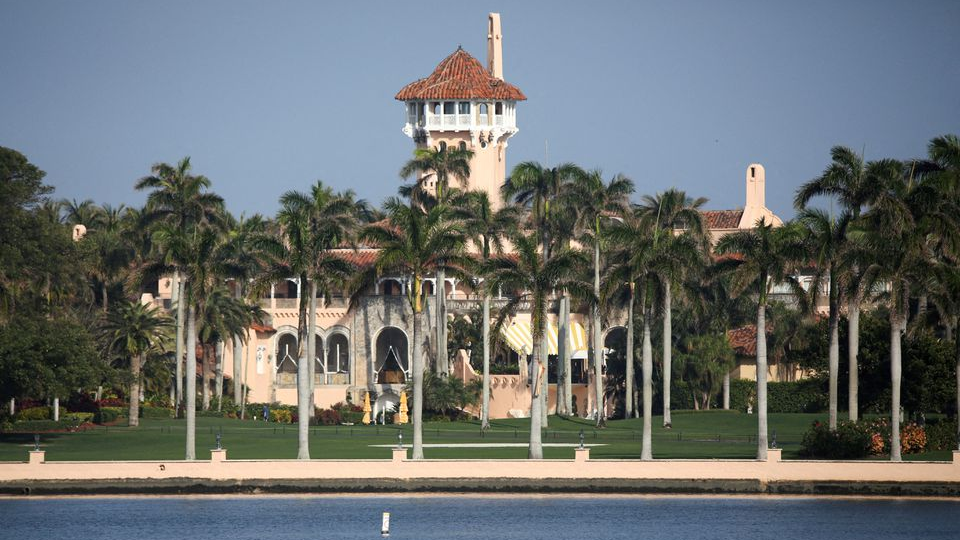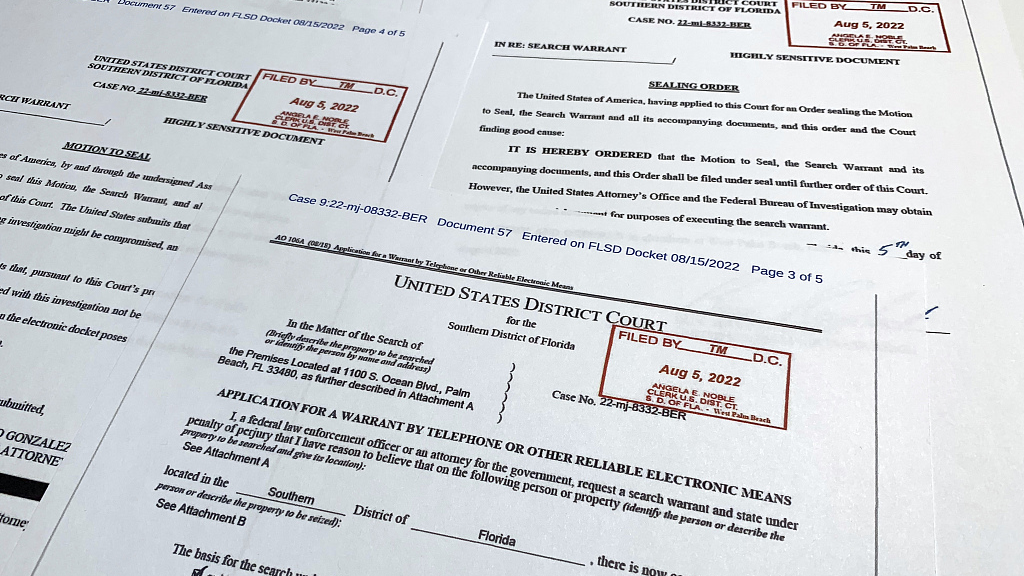
Former U.S. President Donald Trump's Mar-a-Lago resort is seen in Palm Beach, Florida, the U.S., February 8, 2021. /Reuters
Former U.S. President Donald Trump's Mar-a-Lago resort is seen in Palm Beach, Florida, the U.S., February 8, 2021. /Reuters
Editor's note: Zhu Zheng is an assistant professor focusing on constitutional law and politics at China University of Political Science and Law. The article reflects the author's opinions, and not necessarily the views of CGTN.
Recently, former U.S. President Donald Trump and his legal team have initiated a lawsuit against the Department of Justice (DoJ) – they attempt to thwart the search warrant, and if possible, retrieve what had been taken from the former president's Mar-a-Lago resort by the FBI.
The legal team is asking a judge to give a clear list of what was taken, and to appoint a special master – a "neutral" third-party attorney – to determine whether the executive privilege covers certain communications of the former president, so that files seized by the FBI will not be handed over to the court.
Trump's lawsuit aims to put certain documents under wraps so as to preclude the evidence from being submitted to the court. On the whole, the argument of Trump's legal team concerns substantial and procedural defects of the search.
In terms of the substantial deficiency, Trump's lawyers argued that the scope of the search is too broad and it infringes upon a citizen's constitutional right under the Fourth Amendment of the U.S. Constitution, the right of the people "to be secure in their persons, houses, papers, and effect, against unreasonable searches and seizures."
The proceeding of the search is more problematic. According to Trump, the FBI did not inform the former president about the search in advance; they turned up unnoticed at the doorstep. Even worse, the specific crime to which the FBI search warrant was related is not disclosed, and the standards of FBI's review are not clear either.
As a result, Trump argued that his safety has been threatened and his constitutional rights violated. He even went so far as to claim that "these are dark times for our nation." However, will Trump's legal challenge go through?
Perhaps not. First of all, different from Watergate, the raid on Trump's mansion was openly conducted and the search warrant was itself issued by a federal court judge.
According to the federal law, it is legal for the federal agency to search without identifying what crime is being investigated. In a similar lawsuit, Trump's former lawyer John Eastman tried to challenge a federal search on the ground that the search violated a federal rule of criminal procedure, or Rule 41. However, in that case, the government argued that Rule 41 can only be used to retrieve property for which the claimant can show an urgent need. In other words, Rule 41 cannot be invoked to regain unnecessary materials, and to challenge the legality of the FBI search.

Documents related to the search warrant for former U.S. President Donald Trump's Mar-a-Lago estate in Palm Beach, Florida, the U.S., August 18, 2022. /CFP
Documents related to the search warrant for former U.S. President Donald Trump's Mar-a-Lago estate in Palm Beach, Florida, the U.S., August 18, 2022. /CFP
Secondly, federal courts usually suspend improper searches in the criminal prosecution. That is to say, unless the claimant is a convicted criminal, it would be rare for the federal courts to seal investigative records.
In the case at hand, it is not yet clear what crime Trump is being connected with, and if the legal ground on which the search warrant was issued is unknown, how would Trump be able to challenge the legality of the search?
Furthermore, federal courts in practice usually favor the government when it comes to issuing a search warrant, because at the moment of issuing such a warrant, the subject of search has no chance to present evidence – the judges usually hear a one-sided presentation by the government. This secrecy would continue until the search is conducted and critical evidence materializes.
Thirdly, although there is a "special master" mechanism where a special officer would be appointed to exclude materials that should not be seen by the government, the person doing the job is independent – the person will not necessarily favor the party who appoints him. In one similar case for example, a retired federal judge was appointed as a special master to screen documents seized, but the judge did not support the plaintiff's arguments.
That means in Trump's case, very likely with the documents seized, the special master, if appointed at all, will allow the FBI to grab any other materials that are put together with the classified files. The FBI could end up examining materials that have nothing to do with the suspected crimes named in the search warrant – no matter what crimes they are.
Therefore, Trump's petition to appoint a special master to review documents seized is likely to be turned down by the court. And even if such a person is appointed, he might not order the government to return the archives obtained. In the light of this, the investigation will possibly harm Trump's chances of running for president in 2024.
(If you want to contribute and have specific expertise, please contact us at opinions@cgtn.com. Follow @thouse_opinions on Twitter to discover the latest commentaries on CGTN Opinion Section.)

